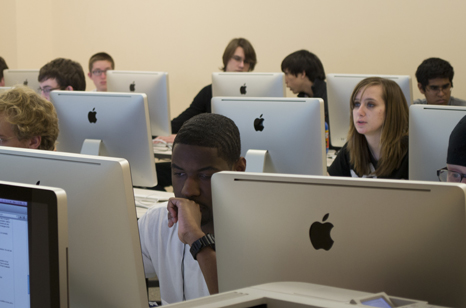
FAYETTEVILLE, Ark. – The University of Arkansas College of Engineering continues to grow. Recruitment and retention efforts combined have led to the largest engineering enrollment in the history of the College of Engineering with 2,726 undergraduates currently enrolled. This is a 73 percent increase since 2007.
This year, the college welcomed another record-breaking 775 new freshmen, an increase of almost 12 percent over last year’s record, and more than double the number of new freshmen entering the college five years ago.
The number of female freshmen has increased by 33 percent. Since 2007, the number of undergraduate female students in the College of Engineering has more than doubled, from 247 in 2007 to 519 in 2012.
The college has grown in ethnic diversity, as well. This year, the number of new African American freshmen has increased by 30 percent. This increase accounts for 70 percent of the increase in African American students campus-wide. Over the past five years, the number of new African American freshmen has increased by 300 percent, from 16 to 64, and the total percentage of engineering students from an ethnic minority has increased by over 40 percent. Minority students now make up a fifth of the college’s undergraduate student population.
This rise in quantity has not come at the expense of quality. The average ACT and GPA of incoming student remains steady at 27.6 and 3.7, respectively.
“We are very pleased with these numbers,” said Bryan Hill, assistant dean for recruitment. “They reflect an engineering program that is growing in size and in our ability to serve underrepresented populations. And a bigger, more diverse class of engineering students means more engineers in the pipeline, getting ready to take on the challenges our society faces. Every day, there are stories about the shortage of engineers in the United States. The College of Engineering is doing its part to alleviate this shortage. The increases would not be possible without an exceptional team of faculty and staff dedicated to recruiting and retaining more engineering students.”
Attracting more engineering students is one thing; keeping them in such a challenging field is another important task. Data show that the retention and graduation rates for the College of Engineering are also improving, thanks to the innovative Freshman Engineering Program, which provides guidance and resources to new engineering students.
Richard Cassady, director of the program, explained that the number of students who return for their sophomore year has risen from an average of 61 percent to an average of 70 percent, and this gain has remained steady even in the face of skyrocketing enrollment.
The combined increases in enrollment and retention have yielded a sophomore class in the college that is twice as large as the average sophomore class before the Freshman Engineering Program. Cassady also pointed out that the 5-year graduation rate for the first class of students who participated in the Freshman Engineering Program is already larger than the average 6-year graduation rate before the program started.
Cassady explained that the integrated nature of the Freshman Engineering Program is what makes the program effective. The program is a “one-stop shopping” experience for engineering freshmen, who get access to all the services of the program through a required Introduction to Engineering course sequence.
“Meeting with a mentor is part of the class,” Cassady said. “Advising is initiated in class. They choose their major and take part in mock interviews through the class. I think that’s what makes it work.”
Contacts
Bryan Hill, assistant dean for student recruitment
College of Engineering
479-575-7203,
Camilla Shumaker, director of science and research communications
University Relations
479-575-7422,